Brown Bear rescue
Sadly, not every bear gets to live freely in the wild. Many are imprisoned in private collections, bred for hunting, caged and farmed, or forced to perform in circuses. At Wildwood Trust, we are dedicated to providing a safe and loving home for bears who have faced unimaginable hardship, giving them a second chance at life. But we can’t do this alone.
We’ve built a home for these bears where they can be safe from the trauma they’ve suffered, a woodland haven where they can rediscover their natural behaviours and begin to heal. We need your help to make sure this vital work can continue.
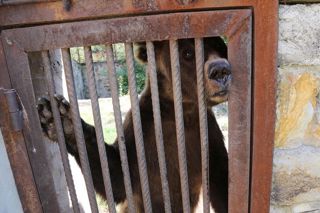
How you can help
Caring for our wildlife requires immense resources - caring for our bears costs £175,000 every year. Help us make sure that these animals get the future they deserve. Every donation helps us not only care for our bears but also protect other animals who need a second chance at life.
- £25 could help feed our bears for a day.
- £50 could help provide enrichment, improving the welfare of our bears.
- £100 could contribute to Boki’s post-surgery care and medication.
Meet the bears we've rescued
Wildwood is now home to five bears, each with their own heart-breaking yet inspiring story.
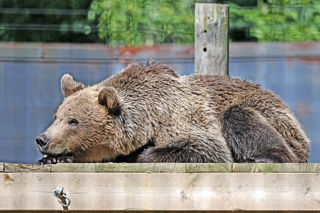
Boki
In December 2022, our bear family got a bit bigger when we adopted a 10-month old bear cub in desperate need of a home. After being rejected by his mother at just ten weeks old, Boki was hand-reared at Port Lympne. As he started to grow, it was clear he needed a new home where he could learn how to be a bear, somewhere he would have the space to play and explore, and other ears to teach him natural bear behaviours.
As expert in brown bear rehabilitation, Wildwood stepped up to make sure Boki could have a home. From the second Boki arrived at Wildwood, he settled straight into his new enclosure, and his new family, our resident bears Fluff and Scruff, took to him immediately. He’s now become like their little brother, and can normally be found playing with the other bears – when he’s not climbing up trees!
Unfortunately, as is often the case with rescued bears, Boki's journey didn't stop when he found a new home. One of the huge problems faced by brown bears is that they can be kept in really poor conditions around the world, so even after their rescue they can face medical problems, as well as the difficulty of overcoming past trauma.

A brave bear cub's fight for life
We noticed back in April that Boki appeared to be having seizures and was not quite himself. After having an MRI, we've found that Boki is suffering from hydrocephalus (fluid on the brain). Whilst his condition was initially being managed with medication, this is no longer having the same effect so our next option is to perform surgery to drain the fluid from Boki's brain and give him a much better chance at a healthier, enriched life.
After consulting with medical experts and considering at length the ethics of this surgery, we believe wholeheartedly this is the best chance of providing a healthy and enriched life for Boki. We're working with specialist wildlife surgeon Romain Pizzi, the only person to have performed brain surgery on a bear before, who is the best possible person for the job and an absolute world leader in his field. Without surgery, Boki would not survive through the winter.
Thank you so much to everyone for caring about how Boki is doing, coming to see him, and supporting us so far. Even with Romain donating his time, Boki's surgery and care is going to cost £20,000. If you’d like to help with Boki’s continued care, you can donate to Wildwood to help us continue to give our bears the lives they deserve.
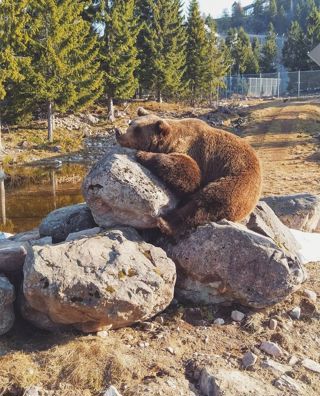
Diego
Diego was the last remaining bear after Sweden's Orsa Predator Park closed its doors in November 2022. If Wildwood had not stepped in to save him, he would have been put to sleep.
He arrived at our park in Devon in the midst of Storm Ciaran in November 2023. The storm made ferry passage too risky, so at the last minute Diego was placed on the Eurotunnel train. He had his own carriage, and arrived at 8pm, tired and sleepy. In the pitch black and windswept with sheets of rain, Diego was transferred from his travel crate into his new dry, warm enclosure.
Diego is a big lad with impeccable manners. He has quickly earned the title of gentle giant amongst the keepers at Wildwood and towers over our half-grown bears, Mish and Lucy, weighing more than 330 kilos.
After spending the winter with us, mostly in torpor, he moved to Jimmy’s Farm and Wildlife Park in Ipswich in Arpil 2024 where they have built him his own woodland enclosure.
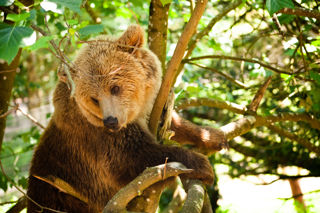
Mish and Lucy
Mish and Lucy are siblings who were discovered in a snowdrift in the Albanian mountains. They were abandoned by their mother, and with predators circling conservationists intervened before the worst could happen. Despite several attempts to reintroduce these bear cubs back into the wild, it was clear they could no longer survive on their own and needed a home. We launched an urgent fundraising campaign to rescue them from certain death in 2020.
Accompanied by Wildwood’s internationally renowned bear rehabilitation experts they were transported to our Kent park where the keepers and rangers had built a special enclosure for them. They lived there for six months while the team worked tirelessly to create a diverse environment for them to explore, forage, and play in our Devon park, and in 2021 they make a successful road trip to their forever home.
Mish is bigger than Lucy and is a playful bear. He revels in splashing around in the pool and swinging in his hammocks. Lucy wins hearts with her endearing, teddy bearish face and big brown eyes. She's the smaller of the sibling pair and loves nothing more than spending time in the company of her brother, and climbing trees.
Feeding them is no small feat. In a single day, they consume kilos of berries, fruits, vegetables, seeds, fish and meat.

Fluff and Scruff's history
Fluff and Scruff, the first of our bears to make Wildwood their home, were rescued in November 2014 from a disused bear hunting centre in Bulgaria.
Born in isolation into tiny concrete pits, these barren cells were the bears’ whole world for 15 years – they had never set foot outside of those cells, never seen a tree, never touched grass. Their only interaction with other life came from being fed porridge through the bars of their cell, and hearing the sounds of other bears suffering somewhere nearby.
They were desperately underweight and displaying signs of serious stress; Fluff used to spend hours pacing and hugging the walls, Scruff used to rub his paws repeatedly on the floor until they bled.
We knew we had to help these bears, and give them a second chance at life.
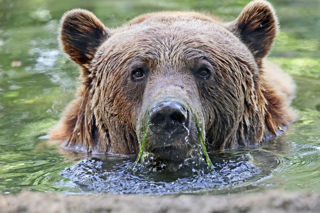
Fluff and Scruff's journey
Our incredible supporters helped us raise enough money to rescue Fluff and Scruff, and bring them 1600 miles by truck and ferry to their new woodland home.
When they first arrived they were half the weight an adult bear should be, and suffering from severe trauma and PTSD. With expert care from our dedicated keeper team, the bears started to eat a more natural diet and gain strength.
Up until this point, they had only seen each other through a fence, so when it came time to let them both into the same enclosure, the keepers waited anxiously as Fluff and Scruff met each other properly for the first time. With a huge sigh of relief, the two bears embraced and immediately began to explore their new home together.
They now have a large woodland enclosure full of trees and plant life for them to forage through, caves to explore, and a pond with a waterfall to play in.

Fluff and Scruff go into torpor
The next big step in their recovery came in 2017 when the keepers noticed a change in their behaviour as the temperatures started dropping.
Fluff and Scruff both started slowing down, spending more time in bed and became a lot less active. They showed all the signs that they were ready to hibernate for the winter, just as they would in the wild, although with our weather being a bit milder, they go into a state of torpor instead. For the first time in their lives, and making history in the UK, they went into torpor.
Our rehabilitation efforts are about encouraging natural behaviours, and never have our efforts been so rewarding.
The rescue and care of brown bears is an expensive and challenging endeavour, but we are driven forward by love and commitment to our bears. We would not be able to do this vital work without support and donations from the public.
Your support is essential in giving these bears a second chance. Together, we can give rescued bears hope for a better future.

